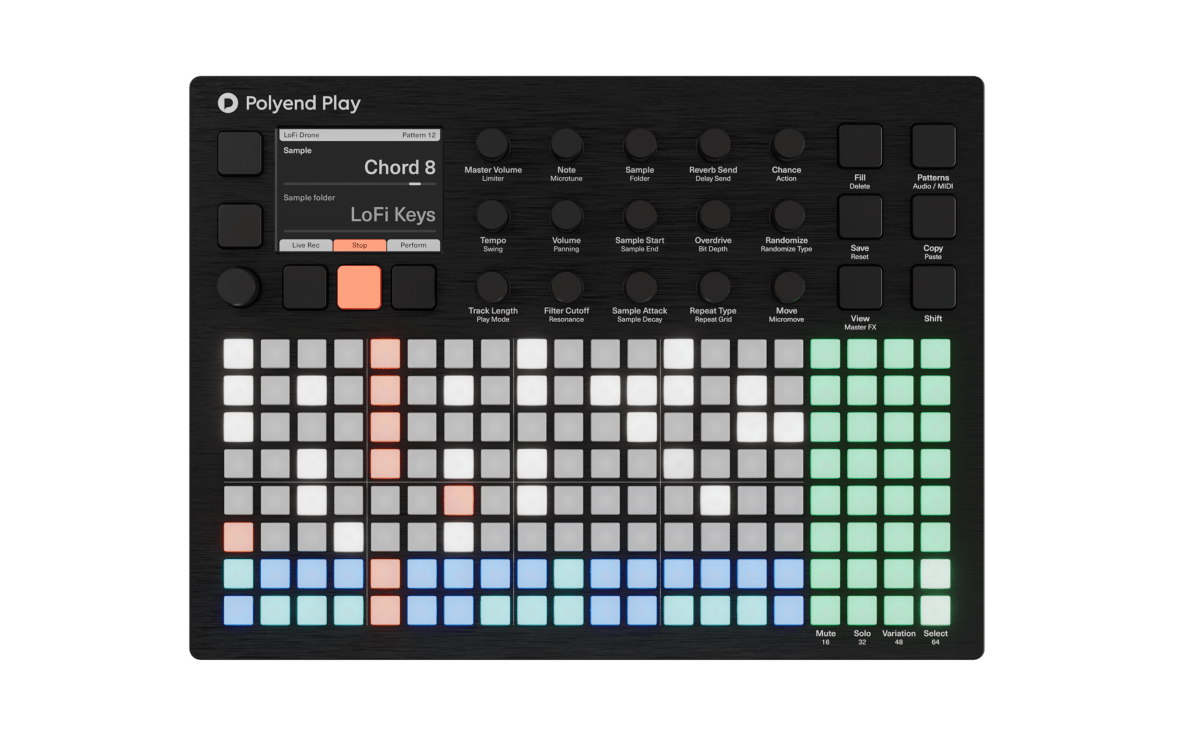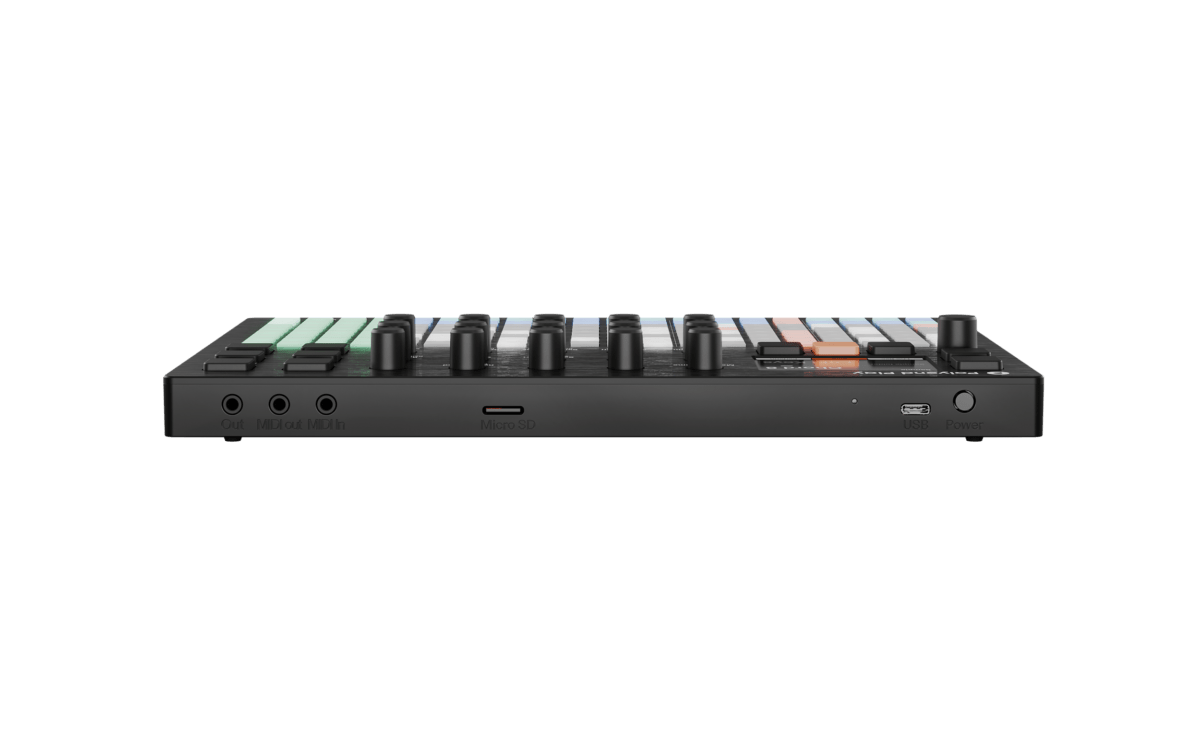
POLAND, OLSZTYN: Polyend proudly presents Play as its latest product to definitively do that — thanks to its open sandbox approach to playing, performing, and sequencing, Play is quite possibly the most fun sample- and MIDI-based groovebox ever, enabling endless possibilities for fingertip-accessible beats by offering over 30 top sound designer-created sample kits to play with right out of the box, create your own beats, and more.
The name of Play (partially) gives away the game’s revolutionary nature. At first glance, it appears to be superficially similar to Polyend’s previous product release, Tracker (https://polyend.com/tracker/), which effectively extracted the best bits of yesteryear’s tricky tracker software classics and rebooted them with forward-looking functionality as the world’s first hardware tracker, deftly designed as an easy-to-use compact standalone workstation with immediacy and simplicity at its creative core.
Entering Play Mode makes it simple to select a sample — simply use the Sample knob to browse through samples in the project’s sample pool, then double-tap that knob (for Folder) or use the dedicated screen buttons to toggle between Sample and Sample folder — and place it anywhere on the 16×8 step sequencing grid that dominates Play’s simple faceplate to begin building tracks. It’s also easy to independently adjust step parameters thanks to Play’s placement of familiar sample-based controls (such as Sample Start, Sample End, Sample Attack, and Sample Decay) well within reach, as well as providing ownership of each track courtesy of that Play Mode (numerous as 35 custom choices), a Chance and Action combo (to set up some automated actions, with the former being an algorithmic or percentage-based probability of the latter), and Ra (capable of making short stutters, pitch effects, volume fades, and more). If inspiration doesn’t strike right away, you can use the clever Fill tool to fill any area with a full beat, a random placement of steps, or even a Euclidean spread. Moving data – steps, tracks, track pages, and variations — around is a pleasure using simple Select, Copy, and Paste controls. But why not keep it musical by constraining Play to only input and output notes that meet the scale you’ve chosen? Of course, as impressive as all of that is, the game is far from ended!
Play’s Perform mode allows you to make non-destructive changes to tracks using performance effects like Filter Cutoff, Resonance, Microtune, Overdrive, and more, while a variety of Master FX — delay, limiter, reverb, saturator, and sound enhancer — are managed with a bunch of professionally presented presets to spice up entire mixes. Live recording automation (using the onscreen Live Rec button) or changing individual step values on the fly, as well as recording monophonic or polyphonic MIDI data, are all available (using the Note knob, the View controller function, or an external controller). Patterns may be customized to lay out whole sequences anywhere on the grid for live performance, and patterns can be saved and reset – ideal for getting out of a tight place musically if something goes wrong during a live performance.

Play is clearly not limited to the confines of a typical sample-based groovebox, but its remarkable sequencing abilities are unrivaled, with eight internal audio tracks and eight unique polyphonic MIDI tracks combining for robust external instrument integration. Indeed, thanks to 128 Patterns containing 16 tracks, each with up to 16 permutations, there are 30,000 track variations possible! Track lengths range from one to 64 steps, and each track can benefit from various BPM-related Tempo and even Swing values, as well as numerous styles of playback, allowing you to go wild with pain-free polymeters and polyrhythms! With the ability to output a separate set of MIDI values per track, Polyend’s Play also makes it simple to control external synths and drum machines on individual tracks — not to mention flexible MIDI CC mapping per track for its individual rotary knobs, allowing users to connect an external controller for MIDI note input. Chords, arpeggios, program and bank changes, pitch bend, clock, and much more can all be output.
Polyend’s Play is built around a rugged anodized aluminum faceplate with a split-screen high-resolution display, 15 durable touch-capacitive knobs (that can be tapped once to select and preview a parameter or twice to switch between upper and lower screen values), and high-quality mechanical keys and silicone pads (powering that 16×8 sequencing grid and an associated 4×8 control grid with flexible — Mute, Solo, Variation, and Select — functionality) alongside high-quality mechanical Meanwhile, MIDI Out and MIDI In are accessible via 3.5 mm mini-jacks on the slimline back panel, with a mini-jack to MIDI DIN (Type B) adapter provided, as well as a 3.5 mm mini-jack stereo Out(put) and a Micro SD slot — 16GB card with microSD to USB-A adapter included — with (5V/1A) power. A USB-C connection provides electricity, which may be conveniently charged by a portable power bank, computer, or the bundled wall adapter.
Anyone who wants to play, perform, or sequence with Play should be able to do so with the help of the 3,000 carefully picked samples that come with it. Play can import WAV files in any sample rate — 16-, 24-, or 32-bit, mono or stereo — and automatically convert them to the supported format, which is then turned into a monophonic mixdown of both the left and right stereo sample channels. Although its internal engine works with uncompressed 16-bit mono PCM Wave files with different sample rates, Play can import WAV files in any sample rate — 16-, 24-, or 32-bit, mono or stereo — and automatically convert them to the It’s worth noting that while the overall per-project sample pool memory is six minutes of monophonic 16-bit/44.1 kHz sample files, halves the sample rate doubles the sample pool capacity because Play can clearly function with a variety of sample rates.
Play is the most fun, adaptable, and inspirational sample- and MIDI-based groovebox ever, allowing for unlimited possibilities for fingertip-accessible beats as a compact centerpiece of any studio or stage setup. Far from the constrictive confines of a typical sample-based groovebox, Polyend’s open sandbox approach serves the company proud, allowing creative musicians to explore new musical possibilities as another game-changing game changer in the making.
Play is available for preorder through Polyend’s expanding global network of authorised dealers (https://polyend.com/where-to-buy/) at an MSRP (Manufacturer’s Suggested Retail Price) of €799.00 EUR/$799.00 USD, or directly through its dedicated webpage (which includes more in-depth information) here: http://polyend.com/play/.
